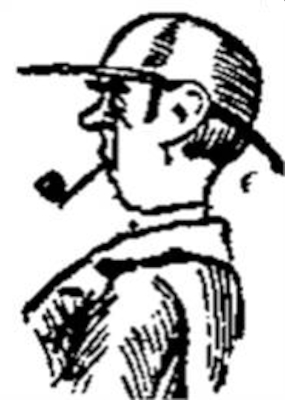This article has been transcribed from a copy of the Cardiff Times in the online collection of scanned Welsh newspapers 1804-1919 in the National Library of Wales, with grateful recognition of the free access accorded to all readers. Paragraph breaks have been introduced for easier reading.
The weather was a distinct change after the very cool summer of 1888, and Samuel takes it as an excuse for the consumption of alcohol. As usual, he drinks Irish whiskey, or perhaps misspells Scotch ‘whisky’. Charles Dickens’s ‘celebrated reference’ to tomatoes in the case of Bardell v. Pickwick, for breach of promise in Pickwick Papers concerns a note from Pickwick to his landlady, Mrs Bardell, which reads,
‘Dear Mrs. B.--Chops and tomato sauce. Yours, PICKWICK.’ Addressing the jury, Serjeant Buzfuz exclaims, ‘Gentlemen, what does this mean? Chops and tomato sauce. Yours, Pickwick! Chops! Gracious heavens! and tomato sauce! Gentlemen, is the happiness of a sensitive and confiding female to be trifled away, by such shallow artifices as these?’ The jury finds for Mrs Bardell. [chapter 34]
The early association of the tomato with sexual love was retained in Welsh until modern times. A rural shopkeeper of the editor’s acquaintance found difficulty in insisting that elderly Welsh-speaking ladies should only ask for goods in Welsh, because the time-honoured word for tomato in Welsh was ‘afal cariad’, or love apple. Eventually the shopkeeper agreed to accept ‘tomato’ as a Welsh word, so long as the plural took a Welsh and not an English form, i.e. ‘tomatoau’, because ‘tomato’ was in any case not a native English word. Samuel seems not to share the widespread English distrust of ‘weggybubbles’ and French cuisine.
Many Victorians regarded vegetables as dangerous, unless boiled for a very long time: hence the infamous, traditional aroma of English boarding houses. See the article ‘Vegetables’ in Kettner’s Book of the Table (1877) by the brilliant author, critic, journalist and gastronome, Eneas Sweetland Dallas: ‘There are no finer vegetables to be found anywhere than in England; and the English do not know how to eat them. The weak point of an English dinner is always the vegetables. Take this for a certainty: the greatest single step in advance for the English family dinner is to decree that regularly every day there shall be a dish of vegetables nicely prepared. It is not a difficult thing to do ’ (475-77). Elsewhere ‘Samuel’ explains the word ‘masher’ as designating ‘the sort of young man who fancies that he can overcome and overawe everybody by the potency of his attractions’ (no. 86, ‘Samuel on slang’, 4th May 1889).

Nice situation this at the seaside – only, why is he so absurdly bashful?
HEW, but it is warm, maister,’ as a man said to me the other day. And it is, with a vengeance. And of course everybody is grumbling more or less – especially the people who have work to do and don't want to do it. ‘Too hot to work,’ say all the idle ones who sit in the shady nooks of favourite ‘publics’ and drink gin and ginger-beer. ‘Really can't work somehow this weather’ say the men who give themselves a day off and then return home to the bosoms of their families to say how exceedingly busy they've been. And oh, sir, how much are the greasy pangs of these ‘melting moments’ intensified by those never-ending nuisances who are wont to inquire ‘Well, is this warm enough for you?’ and who actually imagine that they have said something funny – as though any man in his sane mind could conjure up enough energy to be funny this weather. There is that pestilential lunatic abroad, too, who recommends his friends to take off their flesh and sit in their bones. And strange to say nearly all the people who grumble most about the heat are people who walk about in conventional black top hats, thick frock coats, and heavy boots. Of a truth, it takes a lot to convince the average Englishman that that precious old humbug the sun has deigned to show his flaming, scorbutic visage. An ordinary Briton does not care to be persuaded to mount a broad sombrero and a suit of white ducks – he seems to think that it makes him look like a stage planter. The stereo-typed masher of to-day, with his brown boots, his cross-barred shirt, his brown and almost brimless billycock and his light suit, is wise for once – he does, at least, dress suitably, though, for all that, he dresses more for the benefit of others than in accordance with his own tastes.

Oh, but it is hot!
I was ‘a-speakin’’ of the sun – the fiery-tempered old fraud. As a general rule be cannot be coerced to show his face; he'll neither be led (he very often is lead, so dull is he) nor driven, and when people have cursed him for his conduct for about nine months in the year, he suddenly flies out in a passion and proves himself a regular scorcher. But there's one good thing about this weather, sir, despite the tar in the streets, and that is that it makes one so fearfully thirsty. One can wire in at liquids like a haymaker and never feel very much the worse for it. Not much worse, mind you; though, all the same, I have met a few men during the last few weeks who were unmistakably suffering from sunstroke – you could tell it by their gait and by their speech, and yet some of them seemed to bear it very well and not to care much about it. One can indulge in big drinks this weather – that is if one pays for them, or finds a ‘pal’ who will; either will do, but the latter is preferred by this here child. It is always a pleasure to me personally to be thirsty when the wherewithal to gratify the intense craving I have in stock is at hand – and it is not often that I am not thirsty some people aver.


Left: A party who can always keep cool – Right: Oh, for the b[r]eesy ocean – not even this individual can spoil the picture.
This is the time of roses, is it not? The people who vend bouquets evidently think so, for they do not show the slightest compunctions of conscience in charging sixpence for a very consumptive-looking rose, whose constitution has had to be built up with wire (tincture of iron, I suppose this agreeable rose tonic might be called) and a soupcon of maiden-hair fern. It is the time of roses – and also, be it said, of green peas, of tomatoes (oh, how my soul rejoiceth), and of ripe, delicious, luscious, heavenly strawberries. Touching tomatoes, sir, how much in vogue they have come of late year's in this country. It is not very long ago, sir, since the man who indulged extensively in the luscious ‘weggybubbles’ was regarded as a species of ghoul, a strange animal, given to suspicious courses – the sort of man who would lick his lips over the leg of a frog and hang greedily over a well-prepared dish of snails. Tomatoes were the latter-day epitome of forbidden fruit, and even Charles Dickens assisted in giving them a questionable reputation in his celebrated reference to them in that cause célèbre Bardell v. Pickwick. But tomatoes have vindicated themselves amply; they have proved that they are not all outside show like Dead Sea Fruit or a modern masher.

‘ot, well, rather – and aint got the price of a glass, never to spake of a pint.
This is a teaming [sic] year for strawberries, this is, and a man can bust himself for a mere trifle. Even the venders whose wont it has been to sell delusive baskets, with all the big ones at the top, have been obliged to be honest, and as for the younger generation, they have begun developing as much stomach-ache as must cause the hearts of the chemists and druggists and the family doctor to be glad with them.
Oh, but it is ‘that hot’ that I reproach me if I lay the pen down and wipe my beady brow. Another whiskey and soda, good friend, and a truce to summery articles – I’ll let this article be summary instead. So here goes for the flowing bowl, for perspiration, for the dolce far niente [sweet idleness] – for complete idleness.
Last modified 10 March 2022